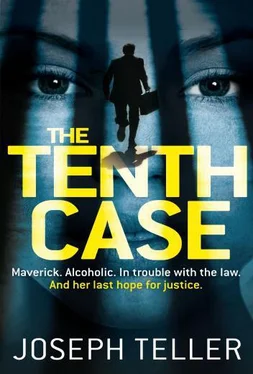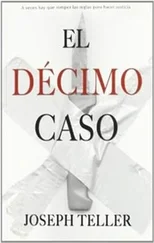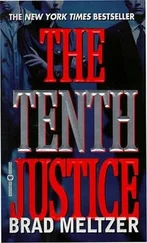Joseph Teller - The Tenth Case
Здесь есть возможность читать онлайн «Joseph Teller - The Tenth Case» — ознакомительный отрывок электронной книги совершенно бесплатно, а после прочтения отрывка купить полную версию. В некоторых случаях можно слушать аудио, скачать через торрент в формате fb2 и присутствует краткое содержание. Жанр: Криминальный детектив, на английском языке. Описание произведения, (предисловие) а так же отзывы посетителей доступны на портале библиотеки ЛибКат.
- Название:The Tenth Case
- Автор:
- Жанр:
- Год:неизвестен
- ISBN:нет данных
- Рейтинг книги:3 / 5. Голосов: 1
-
Избранное:Добавить в избранное
- Отзывы:
-
Ваша оценка:
- 60
- 1
- 2
- 3
- 4
- 5
The Tenth Case: краткое содержание, описание и аннотация
Предлагаем к чтению аннотацию, описание, краткое содержание или предисловие (зависит от того, что написал сам автор книги «The Tenth Case»). Если вы не нашли необходимую информацию о книге — напишите в комментариях, мы постараемся отыскать её.
The Tenth Case — читать онлайн ознакомительный отрывок
Ниже представлен текст книги, разбитый по страницам. Система сохранения места последней прочитанной страницы, позволяет с удобством читать онлайн бесплатно книгу «The Tenth Case», без необходимости каждый раз заново искать на чём Вы остановились. Поставьте закладку, и сможете в любой момент перейти на страницу, на которой закончили чтение.
Интервал:
Закладка:
MR. JAYWALKER: Mr. Manheim, you say you landed an even better-paying job after leaving Mr. Tannenbaum's employ. Is that correct?
MR. MANHEIM: Yes.
MR. JAYWALKER: Would you say Mr. Tannenbaum was underpaying you?
MR. MANHEIM: Considering everything I was doing, yes I would.
MR. JAYWALKER: I see. And what was he paying you?
MR. MANHEIM: (To the Court) Do I have to answer that?
THE COURT: I'm afraid so.
MR. MANHEIM: (Inaudible)
MR. JAYWALKER: Can't hear you.
MR. MANHEIM: Two point seven.
MR. JAYWALKER: Two point seven what?
MR. MANHEIM: Million.
MR. JAYWALKER: Wow.
MR. BURKE: Objection.
THE COURT: Sustained.
MR. JAYWALKER: Sorry. Two million, seven hun dred thousand. That was your total annual compensation?
MR. MANHEIM: Yes.
MR. JAYWALKER: No bonus at the end of the year?
MR. MANHEIM: Well, yes, but that varied from year to year.
MR. JAYWALKER: I see. Well, why don't you tell
MR. MANHEIM: (To the Court) Do I really
THE COURT: Yes.
MR. MANHEIM: One point five. us how much it was for the last full year of your employment?
MR. JAYWALKER: Help me with the math here, if you would. Two point seven plus one point five comes to?
MR. MANHEIM: Four point two.
MR. JAYWALKER: Million.
MR. MANHEIM: Yes.
Okay, thought Jaywalker, here comes the trap Burke had set for him. But why quit now? The jurors seemed abso lutely stunned by the numbers, enough so that they appeared to be having real trouble with Manheim. Perhaps some of their distaste would rub off on Tannenbaum, as well. Jay walker had won his share of cases for no better reason than that the jurors ended up hating the victim more than they did the defendant. Besides, he was having too much fun with the witness to quit now. He shot one last look in Burke's di rection, to see if he could pick up a poker player's "tell." But if Burke was setting Jaywalker up, he gave no sign of it.
MR. JAYWALKER: And this embezzlement, or alleged embezzlement, I should say. What was the total amount in controversy, including end-of-the year bonuses, if there were any?
MR. MANHEIM: There were no bonuses involved.
MR. JAYWALKER: So?
MR. MANHEIM: (Looks at the Court)
THE COURT: Please answer the question.
MR. MANHEIM: Two hundred and twenty-seven.
MR. JAYWALKER: Two hundred and twenty seven what?
MR. MANHEIM: Million.
MR. JAYWALKER: Two hundred and twentyseven million dollars. And did Mr. Tannenbaum ever threaten to go to the police or the federal authorities, or to sue you civilly, or to go public with his claim? Any of those things?
MR. MANHEIM: He never threatened. He hinted, I guess you could say. I told him go ahead, I had nothing to hide.
MR. JAYWALKER: You weren't worried?
MR. MANHEIM: No. Why should I have been?
Just as there are ups and downs to any trial, so, too, are there special moments. Alan Manheim had delivered such a special moment in the midst of his answer to Jaywalker's question. Not with what he said, but how he said it. He got the "No" out all right. But two words later, on should, his voice cracked, and the word came out in falsetto. No one missed it. No one could have missed it. So Jaywalker let it hang there for a good fifteen seconds, staring at the witness, not saying a word.
If you don't think fifteen seconds can be an eternity, try doing absolutely nothing for that long, right now.
Finally, Jaywalker broke his own silence just long enough to ask one final question.
MR. JAYWALKER: Tell me, Mr. Manheim. That two hundred and twenty-seven million dollars. Would you call that chump change?
MR. MANHEIM: No.
They broke for lunch.
"You shredded him," said Samara, once she and Jay walker were safely out of earshot of the jurors. "You were sensational."
She was right, at least about the shredding part. For a prosecution witness, Alan Manheim had come off quite poorly. His multimillion-dollar compensation, along with the distinct possibility that he'd stolen many times that amount from his employer, had to have had a negative impact on jurors who worked hard just to make ends meet at the end of the month. Still, it was quite a stretch to ask those same jurors to conclude that because Manheim was overpaid and perhaps even a thief, he was therefore also a murderer. And even if they wanted to make that leap and consider a scenario in which Manheim had murdered Barry Tannenbaum before Tannenbaum could expose the em bezzlement, then made it look as though Samara had done it, there remained the little problem of access. How could Manheim have sneaked into the building past Jose Lugo, gotten into Tannenbaum's apartment, stabbed him to death, locked the door on his way out without a key and slipped out of the building past Lugo? And even if he'd managed to do all those things, that was the easy part. The hard part would have been getting into Samara's town house without a key, hiding the towel, the blouse (her blouse) and the knife, and then sneaking back out-all while Samara had been there.
"Don't get cocky," he cautioned Samara. "We had a good moment, but in the long run, it probably doesn't mean anything."
"If I feel like getting cocky," she smiled, "I'll get cocky." And then she did the one-raised-eyebrow thing.
That from a woman who was an odds-on favorite to end up with twenty-five years to life from this trial. How she was able to joke about it, Jaywalker had no idea. Not only joke about it, but actually squeeze a laugh out of him.
"Go get something to eat," he told her. "I'll see you back in the courtroom." And before she could turn that into a joke, too, he turned and walked away.
That afternoon Burke called the fourth and last of Jay walker's "suspects," William Smythe. Smythe, a CPA with an English accent and a tweedy three-piece suit, was Barry Tannenbaum's full-time personal accountant. At least he had been, up until the time of Tannenbaum's death.
As he had with Alan Manheim, Burke began by having Smythe make it clear that he'd never had a key to either Barry's apartment or Samara's town house. Then he asked him if he'd ever had a dispute with Tannenbaum, or if Tan nenbaum had ever accused him of any wrongdoing.
MR. SMYTHE: Absolutely not. I mean, as would be the case with any two people who worked to gether on financial matters for sixteen years, we had our occasional differences of opinion as to how to do certain things. But it was never more than that. I loved Barry like a brother, and I'd like to think he felt the same way about me.
Pardon me while I vomit, thought Jaywalker. But from the look Judge Sobel shot his way, he realized he must have done more than just think it. Jaywalker's wife used to accuse him of snorting out loud whenever he wanted to register his dis approval of something but didn't want to come right out and say so. Perhaps he'd snorted just now, though he hadn't been aware of doing so. Evidently it was becoming an un conscious habit, like a tremor or a facial tic. Maybe it was the first sign of dementia, of early-onset Alzheimer's disease.
God, how he needed to get out of this racket.
Burke had Smythe describe his duties as Tannenbaum's accountant, and they were extensive-not only in their breadth, but in the depth of trust they revealed. Smythe ran his employer's personal finances far more than Manheim had. He kept track of receipts and expenditures, balanced the books and juggled half a dozen bank accounts. He enjoyed full power of attorney to sign his employer's name to leases and other contracts. When a check went out over Barry Tannenbaum's name, chances were William Smythe had actually signed it, a fact well known and condoned by all of Tannenbaum's many bankers.
Aside from his I-loved-him-like-a-brother speech, Smythe came off as a genuinely likeable witness. Unlike Manheim, he'd had no reason to fear retaliation at the hand of Barry Tannenbaum. And had he been inclined to steal any of Barry's riches, he could have done so easily enough, with the simple stroke of a pen.
Читать дальшеИнтервал:
Закладка:
Похожие книги на «The Tenth Case»
Представляем Вашему вниманию похожие книги на «The Tenth Case» списком для выбора. Мы отобрали схожую по названию и смыслу литературу в надежде предоставить читателям больше вариантов отыскать новые, интересные, ещё непрочитанные произведения.
Обсуждение, отзывы о книге «The Tenth Case» и просто собственные мнения читателей. Оставьте ваши комментарии, напишите, что Вы думаете о произведении, его смысле или главных героях. Укажите что конкретно понравилось, а что нет, и почему Вы так считаете.












